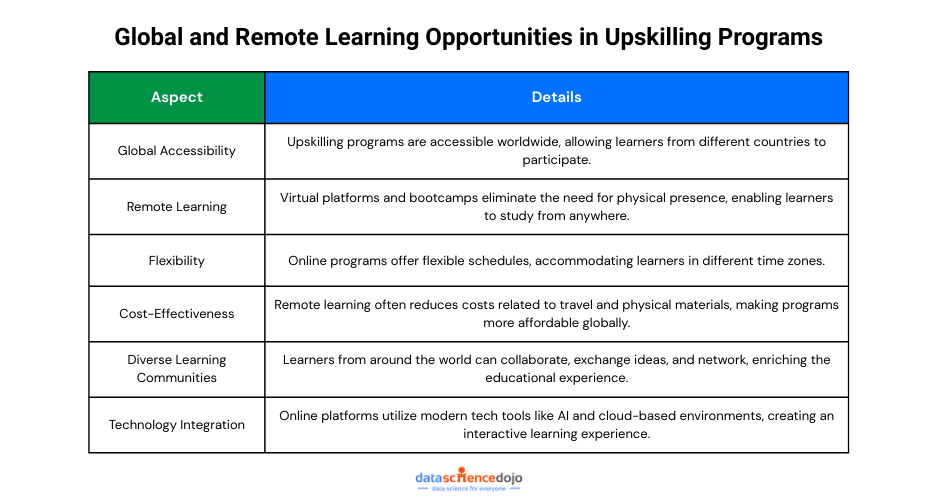Recognizing the growing significance of data science in our technology-driven world, customizable upskilling programs have gained traction. These programs enable individuals and organizations to establish and strengthen their foundational data science skills, fostering the creation and dissemination of modern, integrated, high-quality information. They offer teams within companies access to a diverse range of data science courses, technical bootcamps, and personalized mentoring from experienced coaches.
The Importance of Staying Ahead in Tech
For data scientists, upskilling is crucial for remaining competitive, excelling in their roles, and equipping businesses to thrive in a future that embraces new IT architectures and remote infrastructures. By investing in upskilling programs, both individuals and organizations can develop and retain the essential skills needed to stay ahead in an ever-evolving technological landscape.
Benefits of Upskilling Data Science Programs
Upskilling data science programs offer a wide range of benefits to individuals and organizations alike, empowering them to thrive in the data-driven era and unlock new opportunities for success.
Enhanced Expertise: Upskilling data science programs provide individuals with the opportunity to develop and enhance their skills, knowledge, and expertise in various areas of data science. This leads to improved proficiency and competence in handling complex data analysis tasks.
Career Advancement: By upskilling in data science, individuals can expand their career opportunities and open doors to higher-level positions within their organizations or in the job market. Upskilling can help professionals stand out and demonstrate their commitment to continuous learning and professional growth.
Increased Employability: Data science skills are in high demand across industries. By acquiring relevant data science skills through upskilling programs, individuals become more marketable and attractive to potential employers. Upskilling can increase employability and job prospects in the rapidly evolving field of data science.
Organizational Competitiveness: By investing in upskilling data science programs for their workforce, organizations gain a competitive edge. They can harness the power of data to drive innovation, improve processes, identify opportunities, and stay ahead of the competition in today’s data-driven business landscape.
Adaptability to Technological Advances: Data science is a rapidly evolving field with constant advancements in tools, technologies, and methodologies. Upskilling programs ensure that professionals stay up to date with the latest trends and developments, enabling them to adapt and thrive in an ever-changing technological landscape.
Professional Networking Opportunities: Upskilling programs provide a platform for professionals to connect and network with peers, experts, and mentors in the data science community. This networking can lead to valuable collaborations, knowledge sharing, and career opportunities.
Personal Growth and Fulfillment: Upskilling in data science allows individuals to pursue their passion and interests in a rapidly growing field. It offers the satisfaction of continuous learning, personal growth, and the ability to contribute meaningfully to projects that have a significant impact.
Global and Remote Learning Opportunities

Maximizing ROI: The Business Case for Data Science Upskilling
Upskilling programs in data science provide substantial benefits for businesses, particularly in terms of maximizing return on investment (ROI). By investing in training and development, companies can unlock the full potential of their workforce, leading to increased productivity and efficiency. This, in turn, translates into improved profitability and a higher ROI.
When employees acquire new data science skills through upskilling programs, they become more adept at handling complex data analysis tasks, making them more efficient in their roles. By leveraging data science skills acquired through upskilling, employees can generate innovative ideas, improve decision-making, and contribute to organizational success.
Investing in upskilling programs also reduces the reliance on expensive external consultants or hires. By developing the internal talent pool, organizations can address data science needs more effectively without incurring significant costs. This cost-saving aspect further contributes to maximizing ROI. Here are some additional tips for maximizing the ROI of your data science upskilling program:
- Start with a clear business objective. What do you hope to achieve by upskilling your employees in data science? Once you know your objective, you can develop a training program that is tailored to your specific needs.
- Identify the right employees for upskilling. Not all employees are equally suited for data science. Consider the skills and experience of your employees when making decisions about who to upskill.
- Provide ongoing support and training. Data science is a rapidly evolving field. To ensure that your employees stay up-to-date on the latest trends, provide them with ongoing support and training.
- Measure the results of your program. How do you know if your data science upskilling program is successful? Track the results of your program to see how it is impacting your business.
Assessment and Feedback Mechanisms
One of the most critical yet often overlooked aspects of successful upskilling programs is the integration of continuous assessment and timely feedback. Regular evaluations not only provide learners with a clear understanding of their progress but also serve as a powerful motivator by recognizing growth and identifying areas that need improvement.
Why assessment matters: Assessments—whether through quizzes, hands-on projects, or peer reviews—act as checkpoints throughout the learning journey. They ensure that participants are not only consuming information but also retaining and applying it effectively. For instance, practical exercises or mini-capstone projects can validate a learner’s ability to implement concepts like data cleaning, model building, or visualization in real-world contexts.
The role of feedback: Feedback transforms assessment from a passive score into an active learning tool. Constructive input from instructors, mentors, or even AI-driven learning platforms can help learners understand why a solution works—or doesn’t. More importantly, personalized feedback allows learners to pivot, adjust their strategies, and deepen their understanding over time.
Tracking and optimizing learning outcomes: Continuous assessments allow program facilitators to gather data on learner performance, which can be used to fine-tune content delivery, pace, and support. Learners benefit from clear benchmarks, while educators gain actionable insights to better support participants in achieving their goals.
By embedding assessment and feedback into the core of an upskilling program, organizations can create a loop of growth and adaptation—ensuring that skill development is not just theoretical, but genuinely transformative.
Long-Term Career Development
Upskilling programs are not just about immediate skill acquisition—they are a strategic investment in long-term career growth. As the data landscape evolves rapidly, professionals who consistently upgrade their skills are better positioned to climb the career ladder and stay relevant in a competitive job market.
From Data Analyst to Data Scientist: A common progression path in the data domain is transitioning from a data analyst to a data scientist. While analysts typically focus on interpreting data and generating reports, data scientists go a step further—building predictive models, designing experiments, and making data-driven decisions using machine learning and advanced statistics.
This leap often requires learning new programming languages, statistical methods, and tools like Python, R, SQL, or cloud-based data platforms.
The role of upskilling programs in career transitions: Structured upskilling programs provide a clear roadmap for professionals seeking to advance. By breaking down complex skills into manageable modules, learners can progressively master advanced concepts while applying them in practical scenarios. Whether it’s learning to build machine learning models or understanding the ethical implications of AI, these programs create a foundation for continuous growth.
Staying adaptable in a dynamic industry: Technology and tools in data science evolve quickly. Continuous learning through upskilling programs ensures that professionals don’t just adapt—they lead innovation. This kind of agility not only helps in vertical growth (promotions, role shifts) but also opens doors to horizontal opportunities such as moving into roles like data engineer, business intelligence developer, or AI specialist.
Upskilling Programs in a Nutshell
In summary, customizable data science upskilling programs offer a robust business case for organizations. By investing in these programs, companies can unlock the potential of their workforce, foster innovation, and drive sustainable growth. The enhanced skills and expertise acquired through upskilling lead to improved productivity, cost savings, and increased profitability, ultimately maximizing the return on investment.




